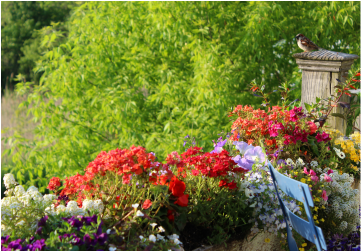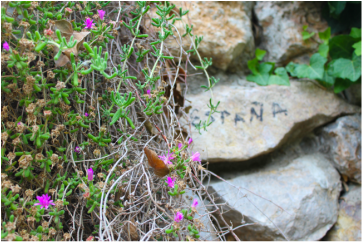ABOUT ME
I am a first-generation, queer, woman of color in science bearing a complex identity, comprised by my myriad of passions and my bicultural upbringing.
I've never truly been able to identify any one place on this Earth as my "hometown" or as "where I am from," as I've lived a bit of a nomadic existence. Though, I was born in the United States, I was raised by my grandparents and our community in Nadiad, India, moving back stateside at age eight. My family and I moved to Georgia when I was age eleven, where I would spend my formative years. While I was an undergraduate student at Georgia State University in Atlanta, Ga, I spent time living and studying abroad in Perugia, Italy. I moved to New York City in 2012, and it is still the only city in America I've ever felt I truly belonged. I moved to the sunny west coast in 2017 to work towards my PhD in Microbiology at University of California, Berkeley.
In terms of my science, I am a burgeoning microbial ecologist with a background in molecular and cell biology and yeast genetics. I am excited to pursue an industry career in plant-based foods, bioengineering, bioremediation, and/or synthetic biology. I am passionate about social justice and equity for all humans and actively participate in advocacy through campus and community projects, amplifying my voice and voices of others when and where I am able to. Finally, I have a deep appreciation for arts and music and love building my creative muscles through a number of different mediums, such as photography, acrylic and oil painting, charcoal and fiddling my violin or piano on occasion.
Currently based in Berkeley, CA.
I've never truly been able to identify any one place on this Earth as my "hometown" or as "where I am from," as I've lived a bit of a nomadic existence. Though, I was born in the United States, I was raised by my grandparents and our community in Nadiad, India, moving back stateside at age eight. My family and I moved to Georgia when I was age eleven, where I would spend my formative years. While I was an undergraduate student at Georgia State University in Atlanta, Ga, I spent time living and studying abroad in Perugia, Italy. I moved to New York City in 2012, and it is still the only city in America I've ever felt I truly belonged. I moved to the sunny west coast in 2017 to work towards my PhD in Microbiology at University of California, Berkeley.
In terms of my science, I am a burgeoning microbial ecologist with a background in molecular and cell biology and yeast genetics. I am excited to pursue an industry career in plant-based foods, bioengineering, bioremediation, and/or synthetic biology. I am passionate about social justice and equity for all humans and actively participate in advocacy through campus and community projects, amplifying my voice and voices of others when and where I am able to. Finally, I have a deep appreciation for arts and music and love building my creative muscles through a number of different mediums, such as photography, acrylic and oil painting, charcoal and fiddling my violin or piano on occasion.
Currently based in Berkeley, CA.
My Science
The overall goal of my scientific pursuits is to understand how the environment influences ecological systems and organismal biology. Over the past two centuries we have placed unprecedented demands on the Earth’s natural resources. As a result of these pressures, we have witnessed an accelerated loss of biodiversity and a dramatic alteration of ecological patterns and processes. These changes have potentially devastating consequences in the long term if left unchecked. Consequently, I am personally and professionally committed to help find solutions to this crisis.
One major consequence of these demands, resulting from decades of long-term fire suppression strategies, is the increased frequency and breadth of high severity wild fires across our planet. These wildfires have a significant impact on soil carbon stocks, transforming soil organic carbon into pyrolyzed carbon via combustion. These pyrolyzed carbon compounds are chemically heterogeneous, determined by the initial substrates and the temperature at which they are transformed, and much of these are highly aromatic and extremely recalcitrant. These carbon compounds constitute approximately 80% of total soil organic carbon in fire-effected ecosystems. However, this trapped carbon can be emancipated by pyrophilous microbes! I aim to elucidate how these fire-adapted microbes respond to and transform pyrolyzed carbon substrates in post-fire soils using a combination of 16s sequencing and community profiling, transcriptomics and metabolomics with microbes isolated from post-fire soils from Pyrocosms (an experimentally tractable system used to mimic wild fire conditions with defined soil and fuel sources to generate pyrolyzed soils and monitor succession) and via long-term field study sites at Blodgett Forest Research Station. My objective is to elucidate microbial community successional dynamics and metabolic potentials in these environments. My hope is that this research aides in the development of bioremediation strategies to efficiently and effectively rehabilitate soils in fire-effected ecosystems.
One major consequence of these demands, resulting from decades of long-term fire suppression strategies, is the increased frequency and breadth of high severity wild fires across our planet. These wildfires have a significant impact on soil carbon stocks, transforming soil organic carbon into pyrolyzed carbon via combustion. These pyrolyzed carbon compounds are chemically heterogeneous, determined by the initial substrates and the temperature at which they are transformed, and much of these are highly aromatic and extremely recalcitrant. These carbon compounds constitute approximately 80% of total soil organic carbon in fire-effected ecosystems. However, this trapped carbon can be emancipated by pyrophilous microbes! I aim to elucidate how these fire-adapted microbes respond to and transform pyrolyzed carbon substrates in post-fire soils using a combination of 16s sequencing and community profiling, transcriptomics and metabolomics with microbes isolated from post-fire soils from Pyrocosms (an experimentally tractable system used to mimic wild fire conditions with defined soil and fuel sources to generate pyrolyzed soils and monitor succession) and via long-term field study sites at Blodgett Forest Research Station. My objective is to elucidate microbial community successional dynamics and metabolic potentials in these environments. My hope is that this research aides in the development of bioremediation strategies to efficiently and effectively rehabilitate soils in fire-effected ecosystems.






